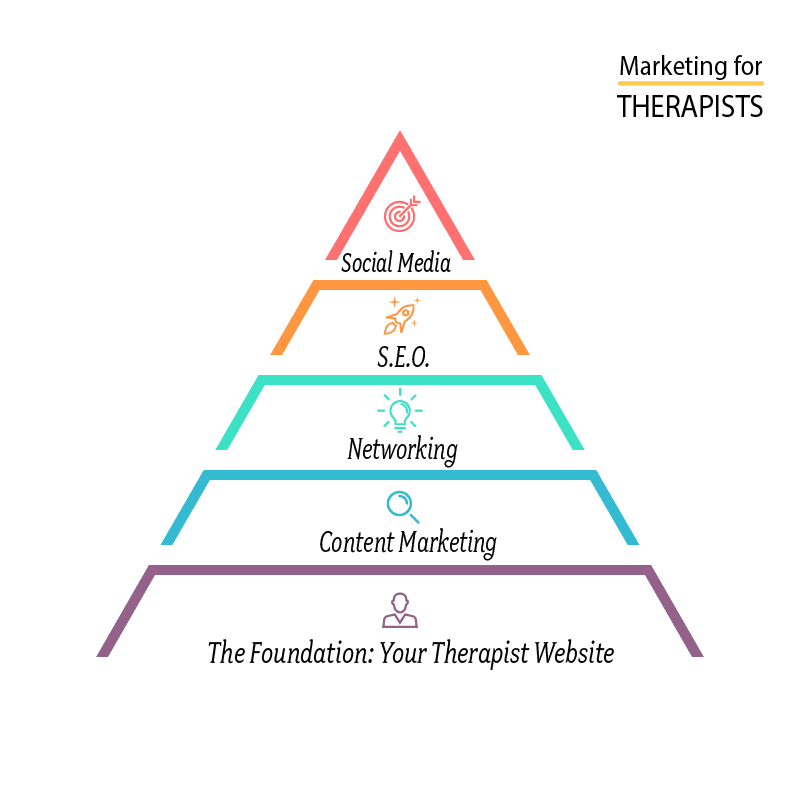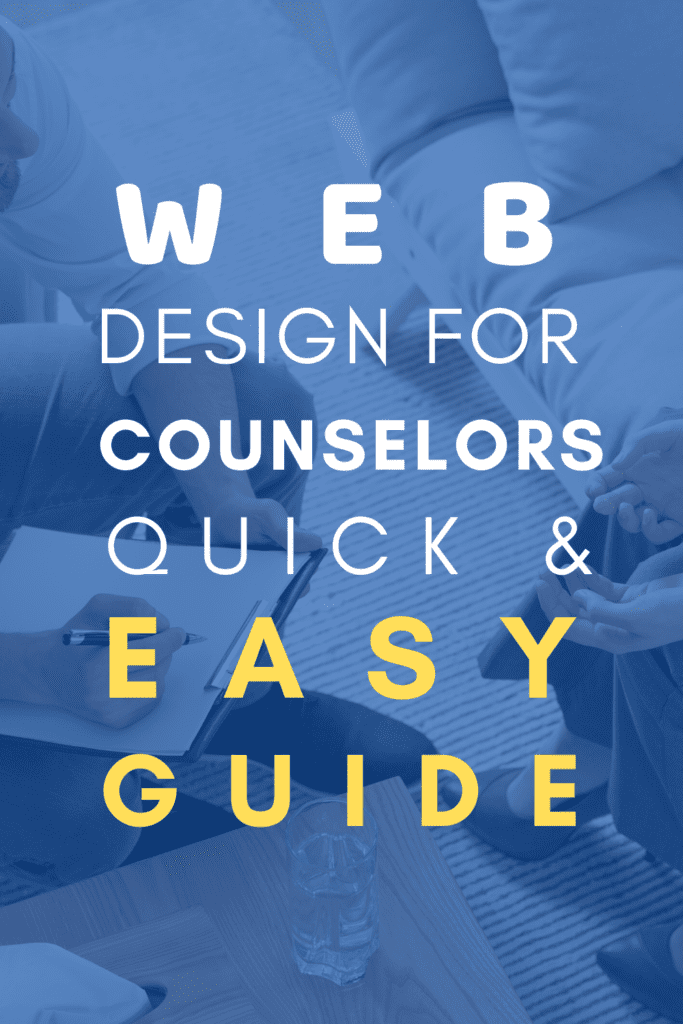Content Marketing for Therapists:
The Ultimate Guide
Content Marketing for therapists can be an intimidating and overwhelming topic.
That’s why today, I’m going to show you how to break down your marketing goals and create an actionable, real-world plan.
Forget feeling lost in a sea of things to do.
I’ve got a strategy you can start using today to grow your practice and bring your business to the next level.
Let’s get started!

Whether you have been in private practice for years, or have just recently left a larger group to establish a practise of your own, the idea of establishing and online presence and coming up with a marketing plan can seem like an impossibly complex goal.
Many mental health professionals experience a great deal of frustration when they realize that, though they have a tremendous amount of valuable education, the degrees they obtained, and the grad school they attended did not adequately prepare them for the challenges of being a small business owner.
The important thing is to realize that you don’t have to do everything!
Setting priorities and creating a marketing plan that matches both your personal goals for your private therapy practice, and also matches the habits and behaviors of your ideal clients is the key.
Table of Contents
Start With the Goal In Mind
The best way to protect yourself from feeling lost and overwhelmed when planning content marketing for therapists, is to really focus in on exactly what you are trying to achieve. And simply saying that you want to “grow your practice” is not enough!
Do you want to attract more clients? If so, which kind of clients? Do you want more clients who are seeking a specific type of support? Or perhaps you want to transition to more clients who are self-pay rather than accepting insurance?
Define your goal with as many specifics as you can, including a concrete measure of how many additional patients you want to attract and what time frame you would like to achieve.


Ask yourself:
- What problems is your ideal client experiencing?
- What is your ideal client’s background / education / demographic information?
- Where are they likely to go first when looking for support? (Their primary care physician, a google search, etc.)
- How can you communicate with that ideal client most effectively?
Once you have the answers to these questions, you can start to approach marketing in a strategic and gradual way. Remember, you don’t have to do everything at once.
Sometimes it is helpful to think of marketing as a pyramid that you build, starting with the foundation and then gradually adding more and more layers.
Your Therapist Website

Your website is your homebase, and the hub from which all your marketing efforts will come.
Trying to market yourself without an online presence is like asking people to call you at a number that has been disconnected.
Don’t let your marketing efforts go to waste!
No matter what marketing strategies you plan to use, the very first thing that most people will do is search for you on Google. This is true even of those clients who are coming to your through referrals. Most potential clients who have been given your name will search for you online before they call you, just to get a better sense of who you are and if you will be a good fit for them.
Having an effective and appealing therapist website helps you to:
- establish that you are legitimate in the eyes of potential clients
- give you a presence as a local businesses in search engine results
- give clients who feel hesitant a way to feel more comfortable reaching out
You can also check out my free video course on the key elements of successful therapist website design.
Once you have a solid foundation for the rest of your digital marketing and in-person marketing and your website is complete, you can move on to the next level in your marketing pyramid.
Content Marketing for therapists
Content marketing for therapists is an insanely powerful move and considered as diverse and modern tool for the business. Basically, the idea is that, by creating useful and engaging content and making it available as a free resource online, you attract exactly those people who are looking for the services you offer.
And the great thing is that content marketing is limited only by your imagination – it can take so many different forms and cover so many different areas.
Blogging
Having a blog is a great way to create content that attracts your ideal customer.
But it’s important to know that the world of blogging has changed a lot in recent years.
When blogging was a new phenomenon, the key was to put out small articles with as much frequency and consistency as possible. Quantity over quality was definitely the way to go.
But, as more people have begun participating in the online world, that equation has flipped, and now quality is much more important, and now having a smaller number of long, in-depth blog posts will benefit you much more that having a ton of short, fluffy pieces.
For example, a physical therapy practice might create blog posts like: “Couch to 5K – Ten Tips you need to know,” or “The 3 Biggest Benefits of Improving Your Posture.”
Marriage and family therapists could create posts like, “The Complete Holiday Survival Guide,” or “What to Do When Your Marriage is in Crisis.”
Whether you provide psychotherapy, are a physical therapist, or other mental health professional, creating blog posts that speak to the concerns and struggles of your ideal clients is a fantastic way to connect with them, build your authority, and create a strong presence for yourself online.
But, maybe blogging isn’t your thing? Does the idea of writing a blog post make your eyes glass over? Not everyone likes to write . . . but that’s just fine! Blogging is just one of the many content creation possibilities.

Video
Video isn’t for everyone, and I get that, which is why it isn’t at the top of this list. But, if I had to recommend just one way of creating a strong content marketing strategy, video would be my #1 recommendation.
Why?
Video is powerful, personal, and not over-saturated. Precisely because not everyone is comfortable doing videos, if you can do it – you will stand out!!
You Tube is the number two search engine that people use when they are looking for resources or trying to figure out how to approach a problem. Creating videos that speak to your ideal client is a perfect way to grow your business and establish your web presence quickly.
What should topics should your videos cover?
The best way to figure this out is to look back at past clients that you have served that represent your “ideal client.”
Ask yourself what symptoms or struggles they wanted to speak with you about when they first approached you for support.
Try to think about the words they used to describe what they were experiencing – not a clinical diagnosis. Looking back at notes from initial session with clients might be a powerful way to learn what issues people are looking for help with the most.
Sharing Resources
This is an approach that not nearly enough people take, and I think that you could find a lot of success with it.
If you prefer not to blog or create videos, think about whether you could instead curate resources that would benefit your ideal clients.
Do you know of websites, associations, or support groups (either online or in-person) that your ideal client would benefit from?
Why not create a post about each, explaining how to find this resource and what someone could hope to learn or gain from accessing that resource?
Are there books that you think your ideal client could benefit from reading? Why not create posts that are book recommendations?
There are resources out there, but sometimes they can be very hard for a layperson to find. Health professionals are uniquely positioned to bridge that gap. By doing so, you can benefit both yourself, and the clients who you are hoping to reach.

Networking
Networking with other professional people in your field, and also with other professionals who serve the same clients as you do, is an indispensable part of small business marketing strategy.
Face to face interaction, though it does take time, is well worth the time that you put into it.
When seeking opportunities to network, start by asking yourself what in-person events you can attend that would give you the chance to meet other people in your field.
Can you:
- attend a workshop?
- go to a lecture?
- participate in a social event for people in your profession?
- join a peer review group, or start your own?
- ask one person you already know to introduce you to two other colleagues that you haven’t met?
- Attend a conference for therapists counselors, or other mental health professionals?
- Another good approach is to think about complimentary professionals who might be serving the same population as you do.
- For example, if you are a physical therapist, can you reach out to a business in your area that offers massage therapy, and suggest a mutual referral relationship?
- Family therapists could try reaching out to school guidance counselors, and establishing relationships with them.
A psychologist who offers individual therapy could reach out to someone who works with couples, and vice versa.
Search Engine Optimization and pay-per-click advertising

Search Engine Optimization (SEO) may not be a quick-fix, but if you have the patience and the time to put into it, it can be very effective over a longer-period of time.
That’s why I suggest taking a long-term approach, and working on it gradually, while prioritizing other approaches (such as content marketing and networking) that are more likely to give you some quick wins.
Similarly, pay-per-click advertising, such as adwords, can be effective but, even when done effectively, it requires an up-front investment of both money and time. When done incorrectly, it can quickly become prohibitively expensive.
I do not say the above to discourage you from pursuing these strategies, but rather to give you a realistic sense of what is involved in pursuing them.
The good news is that SEO for your therapy practice does not need to be as complicated as you may think.
In fact, if you follow my above advice about content marketing, some of that SEO work will happen organically, as you will naturally create content that uses the keywords that you want to target.
If you are ready to take a more deliberate approach, start by identifying a list of keywords that you want to focus on. You can use a free tool such as Ubersuggest or Google Keywords.
Then work on creating unique, high quality content that features those words.
At the same time, strengthen your site by creating links between your therapy website and other websites. This can be done by creating entries for your practice in therapist directories, by appearing on podcasts, or by writing guest blogs for other sites.
Social Media

Why is social media the last (and smallest) level of the pyramid?
There are many reasons why I suggest that therapists prioritize other marketing strategies.
Social media is extremely powerful – but it is also very saturated.
Additionally, the ethical implications for therapists who are using social media can be complex.
This is not a reason to avoid social media all together.
Rather, I suggest picking one or two social media platforms and maintaining a consistent presence on those.
You don’t have to be everywhere at once and, ultimately, you’ll have a better chance of making real headway if you focus your efforts.
So, think about who you are trying to reach through social media, and then ask yourself which of the social media channels they are most likely to be on.
Then, focus just on those one or two social media channels.
Now It’s Up To You
I hope this guide has given you some concrete, actionable ideas about how you can get more website visitors and grow your practice.
Now I want to know what you think:
What is the first thing from this article that you are going to take action on?
What questions do you have about what you’ve read?
Leave a quick comment below and let me know!

Did you like this post? Share it!
Related Reads for Driving Traffic/ Marketing Your Private Practice
- Quotes for Therapists – Inspirational and Uplifting Quotes for Therapists
- Traffic but no sales or clients? Here are 5 Possible Reasons.
- 6 Smart Strategies for Marketing your Private Practice
- Conversion Centered Design for Psychologists’ Websites
- 6 Things When Creating Video Content For Your Business and Therapist Website
- How to Create an Engaging Psychiatrist Website Design to Increase Conversions
- Social Media Marketing for Therapists: Content Prompt Ideas
- How to Create Effective Therapy Website Taglines for Your Practice
- How to Create A Therapist Directory Listing that Gets You Results
- 4-Step Launching Plan: Marketing Strategies for Therapists
- Content Marketing for Therapists – The Ultimate Guide
- How to Market Yourself as a therapist: How to be SEEN online
- Social Media For Therapists – Increasing Reach and Website Ranking
- Website with Social Media Integration for Therapist Websites
- Private Practice Therapist Websites: Secrets to Success – Therapist Websites
- How To Improve Website Traffic For Your Business
Need any of the following?
- Web Design And SEO Services
- Done-For-You Therapist Website Template
- Professional and Customised Web Design
Here are some Sample Websites We’ve Created:
Check out our Portfolio for more!
Pin me!



Hi! I’m Sarah.
I help counselors and therapists have a bigger impact on the world through better client connection. I do this by creating beautiful visuals and strategically designed websites.


1 thought on “Marketing for Therapists”
Great tips, Sarah! I wonder if links to radio shows participations and news clippings would be as usual as blogging or videos. You gave me some very good ideas. Thanks, from Brazil!